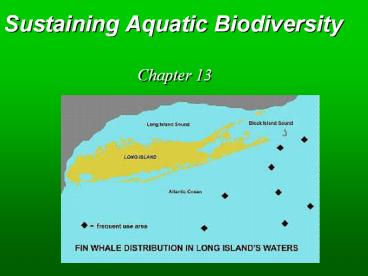Sustaining Aquatic Biodiversity - PowerPoint PPT Presentation
Title:
Sustaining Aquatic Biodiversity
Description:
Sustaining Aquatic Biodiversity Chapter 13 Key Concepts The Importance of Aquatic Biodiversity Marine Species Human Impacts on Aquatic Biodiversity Protecting and ... – PowerPoint PPT presentation
Number of Views:304
Avg rating:3.0/5.0
Title: Sustaining Aquatic Biodiversity
1
Sustaining Aquatic Biodiversity
Chapter 13
2
Key Concepts
- Economic and ecological importance
- Effects of human activities
- Protecting and sustaining aquatic diversity
- Protecting and sustaining fisheries
- Protecting and restoring wetlands
3
The Importance of Aquatic Biodiversity
- Coral reefs
- Deep ocean floor
- Estuaries
- Lakes and streams
- Food items
- Medicines and drugs
4
Marine Species
5
Human Impacts on Aquatic Biodiversity
- Species loss and endangerment
- Marine habitat loss and degradation
- Freshwater habitat loss and degradation
- Overfishing
- Nonnative species
6
Brook trout
White waterlily
Bluegill
White bass
Bulrush
Muskellunge
Rainbow trout
Rainbow darter
Water lettuce
Bowfish
Water hyacinth
Bladderwort
Largemouth black bass
Black crappie
White sturgeon
Yellow perch
Velvet cichlid
American smelt
Walleyed pike
Eelgrass
Longnose gar
Duckweed
Common piranha
Carp
Egyptian white lotus
Channel catfish
African lungfish
7
Protecting and Sustaining Marine Biodiversity
- Protect endangered and threatened species
- International agreements
- Integrated coastal management
- Reconciliation ecology
- Sustainable management of marine fisheries
8
Managing and Sustaining the Worlds Marine
Fisheries
- Fishery regulations
- Economic approaches
- Protected areas
- Consumer information
- Bycatch reduction
- Aquaculture
- Nonnative species
9
Solutions
Managing Fisheries
Fishery Regulations Set catch limits well below
the maximum sustainable yield Improve
monitoring and enforcement of regulations Economi
c Approaches Sharply reduce or eliminate fishing
subsidies Charge fees for harvesting fish and
shellfish from publicly owned offshore
waters Certify sustainable fisheries Protected
areas Establish no-fishing areas Establish more
marine protected areas Rely more on integrated
coastal management Consumer Information Label
sustainably harvested fish Publicize over fished
and threatened species
Bycatch Use wide-meshed nets to allow escape of
smaller fish Use net escape devices for
seabirds and sea turtles Ban throwing edible
and marketable fish back into the
sea Aquaculture Restrict coastal locations for
fish farms Control pollution more
strictly Depend more on herbivorous fish
species Nonnative Invasions Kill organisms in
ship ballast water Filter organisms from ship
ballast water Dump ballast water far at sea and
replace with Deep-sea water
10
Global freshwater
3.5
3.4
3.3
3.2
3.1
3.0
Mean trophic level
2.9
2.8
2.7
2.6
2.5
1950
1960
1970
1980
1990
Year
11
Global marine
3.5
3.4
3.3
3.2
3.1
Mean trophic level
3.0
2.9
2.8
2.7
2.6
2.5
1950
1960
1970
1980
1990
Year
12
Bowhead whale
Bowhead whale
Bowhead whale
Humpback whale
Northern right whale
Bowhead whale
Saimaa seal
Northern right whale
Fin whale
Hawksbill turtle
Mediterranean monk seal
Japanese sea lion
Kemp's ridley turtle
Humpback whale
Hawksbill turtle
Fin whale
Hawksbill turtle
Olive ridley turtle
Olive ridley turtle
Leatherback turtle
Olive ridley turtle
Hawaiian monk seal
Green turtle
Green turtle
Leatherback turtle
Leatherback turtle
Leatherback turtle
Humpback whale
Green turtle
Hawksbill turtle
Green turtle
Humpback whale
Hawksbill turtle
Hawksbill turtle
Humpback whale
Leatherback turtle
Fin whale
Fin whale
Whale
Turtle
Seal
Sea lion
13
Olive ridley 76 centimeters
Australian flatback 99 centimeters
Loggerhead 119 centimeters
Hawksbill 89 centimeters
Black turtle 99 centimeters
Green turtle 124 centimeters
Leatherback 188 centimeters
Kemp's ridley 76 centimeters
14
Atlantic white-sided dolphin
Common dolphin
Harbor porpoise
Killer whale
Bottlenose dolphin
Beluga whale
False killer whale
Pilot whale
Cuvier's beaked whale
Narwhal
Pygmy sperm whale
Sperm whale
Baird's beaked whale
Squid
Odontocetes (Toothed Whales)
15
Humpback whale
Bowhead whale
Minke whale
Right whale
Blue whale
Fin whale
Feeding on krill
Sei whale
Gray whale
Mysticetes (Baleen Whales)
16
Protecting, Sustaining, and Restoring Wetlands
- Regulations
- Wetlands protection
- Mitigation banking
- Wetlands restoration
- Control of invasive species
17
Protecting, Sustaining, and Restoring Rivers
- Pollution
- Disruption of water flow
- Loss of biodiversity
- Invasive species
18
Natural Capital
Ecological Services of Rivers
- Deliver nutrients to sea to help sustain coastal
fisheries - Deposit silt that maintains details
- Purify water
- Renew and renourish wetlands
- Provide habitats for wildlife
19
Life Cycle of Wild Salmon
20
Rebuilding Salmon Populations
- Build upstream hatcheries
- Repopulating streams
- Build fish ladders
- Transport salmon around dams
- Reduce silt runoff
- Restrict dam construction
21
Solutions
Rebuilding Salmon Populations
Building upstream hatcheries Releasing juvenile
salmon from hatcheries to under-populated
streams Releasing extra water from dams to wash
juvenile salmon downstream Building fish ladders
so adult salmon can bypass dams during upstream
migration Using trucks and barges to transport
salmon around dams Reducing silt runoff from
logging roads above salmon spawning
streams Banning dams from some stream areas































